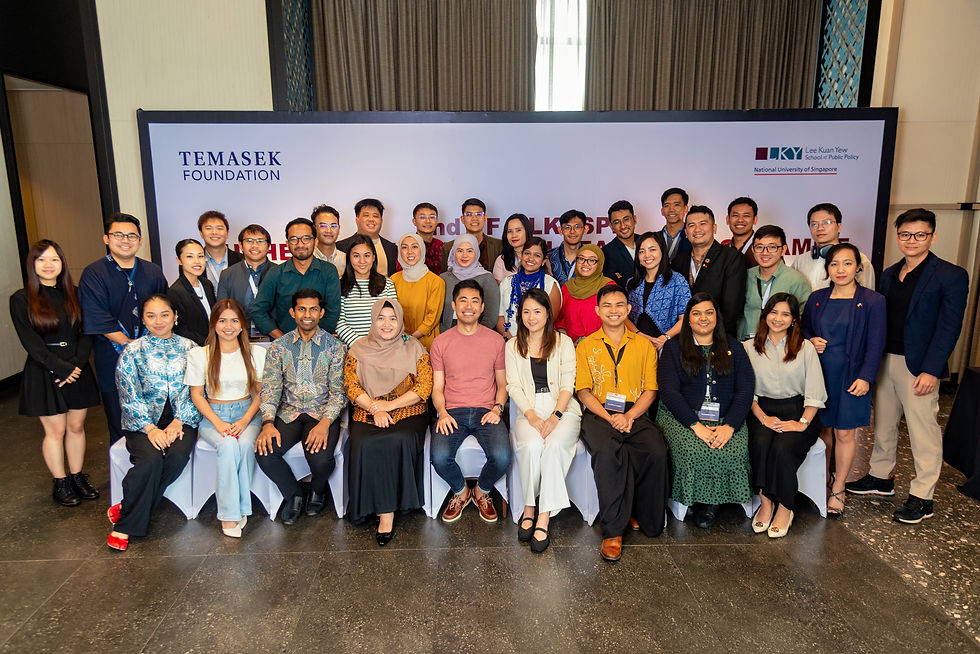ARS assists in the conduct of SEA roundtable discussions for the Tech for Good Institute
- ARS Editorial Staff

- Mar 27, 2023
- 3 min read
[PRESS RELEASE]
Last edited: 27 Mar. | 22:55
Amador Research Services (ARS) provided technical and substantive support to The Tech for Good Institute (TFGI) in the organization and conduct of roundtable discussion (RTD) series in six respective ASEAN member-states, titled “Understanding Tech for Good in Southeast Asia.” The RTDs were held from 15 February to 10 March 2023 in Manila, Kuala Lumpur, Singapore, Jakarta, Hanoi, and Bangkok in cooperation with partner organizations from the six ASEAN countries:
Asian Institute of Management, Philippines (AIM);
MyDIGITAL Corporation, Malaysia;
Infocomm Development Authority of Singapore, Singapore (IMDA);
Indonesia Financial Group, Indonesia;
Central Institute for Economic Management, Vietnam (CIEM); and
Office of National Higher Education Science Research and Innovation Policy Council, Thailand (NXPO).
The RTDs featured a variety of participants and relevant actors in the digital economy from both the public and private sectors of each country. The discussions centered on the significance of digitalization, not only for the growth of the economy but for the betterment of the lives of people, their communities, and societies as a whole. Discussions also tackled the possible risks of such rapid growth in the digital world and how states could mitigate such risk while still promoting development in the sector.
The discussions were opened by the representatives of the respective partner organizations mentioned. Dr. Jamil Paolo Francisco, Executive Director of the Rizalino S. Navarro Policy Center for Competitiveness, AIM opened for the RTD in the Philippines; Mr. Fabian Bigar, CEO of MyDigital, for Malaysia; Mr. Paul Lee, Principal Consultant, Asia Tech x Programme Office, IMDA, for Singapore; Mr. Ibrahim Kholilul Rohman, Senior Research Associate at IFG Progress and Lecturer on Digital Economics at Faculty of Economics and Business, Universitas Indonesia (FEBUI), for Indonesia; Dr. Nguyen Minh Thao, Head of Business Environment and Competitiveness Department, CIEM, for Vietnam; and Dr. Kanchana Wanichkorn, Vice President of NXPO, for Thailand.
Following this, the participants were welcomed by Dr. Ming Tan, Founding Executive Director of the Tech for Good Institute. Dr. Tan emphasized that TGFI, they believe that technology can drive sustainable development for the region, but only if governments, industry, and civil society work together. She briefly set the tone of the program by asking the participants to think about how the concept of “tech for good” may apply in the context of Southeast Asia and their respective states in particular and “how the digital economy companies (DECs) may be encouraged to apply themselves to this agenda through recommendations that are timely, actionable, and measurable for various stakeholder groups to pursue over the next 5 years”.
To assist the participants with their discussion, Mr. Matin Mohdari, Strategy Director of the Tech for Good Institute, presented a scene setter explaining the findings of a study titled “Understanding Tech for Good in Southeast Asia’ conducted by TFGI and the National University of Singapore. Mr. Mohdari explained that the concept of tech for good could go beyond “doing no harm”, and as such can likewise produce positive outcomes for the economy, society, and environment, which can be achieved by actively preventing harms. (i.e., creating novel digital solutions to facilitate the detection of fake news, foster trust, combat fraud, etc.).
Mr. Mohdari also presents three key findings from the study.
The first is that DECs in SEA-6 are still focused on near-term issues that are essential to their operations. He also presented the top issues of focus of DECs in SEA-6 to those of each state specifically.
Second, DECs are focused on stakeholders that are vital to their survival, the top stakeholders identified were investors, customers, business partners, and employees.
Lastly, DECs lack initiative and progress tracking despite the promise of impact commitments.
The set-up and facilitation of the RTDs were unique to each country; nevertheless, the results gathered mirrored the priorities of each country with respect to their digital economies.
Findings and summary points of each countries can be accessed here (this article will be updated in due course): Philippines, Malaysia, Singapore, Indonesia, Vietnam, and Thailand.
The event saw the participation of more than 110 participants total from all six roundtable discussions. Participants came from the government, private, academic, and non-profit sectors and institutions.
Pictures of the roundtables conducted in ASEAN-6 below.
END
















Comments